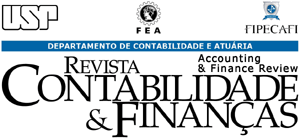ABSTRACT
This study contributes to the literature dealing with the influence of macroeconomic factors on accounting information quality, since it analyzes the earnings management strategies of firms, specifically identifying different discretionary behaviors among economic cycles: 1) different levels of earnings management through accruals between phases of the business cycle, and 2) the trade-off between earnings management through accruals and real earnings management. The results indicate that the accounting information reported should be analyzed with greater caution by its users, especially in periods of great economic oscillations, when managers can increase or reduce opportunistic behavior. The research population comprised non-financial companies with shares traded on the São Paulo Stock, Commodities, and Futures Exchange (BM&FBovespa) and the sample was composed of 247 firms per year, covering the period from 2000 to 2015 and totaling 2,501 observations. The phases of business cycles were used as a proxy for the economic environment and were based on Schumpeter's (1939) study, which divides an business cycle into four distinct phases: expansion, recession, contraction, and recovery. Discretionary accruals were estimated according to the Pae (2005) and Paulo (2007) models. Real earnings management was estimated as described by Roychowdhury (2006), using only the abnormal behavior of production costs and operational decisions. The results of this research show that earnings management strategies, using either accruals or real manipulation, as well as the choice between these strategies, are impacted by the economic environment. The evidence suggests that managers have different opportunistic behavior in each phase of the business cycle. Specifically, they increase the level of discretionary accruals in contractionary phases and reduce it during recoveries, while they manage earnings downwards via real manipulation in recessions and contractions.
Keywords
business cycles; financial crisis; earnings management; accounting information quality

 Thumbnail
Thumbnail
 Thumbnail
Thumbnail
 Thumbnail
Thumbnail
 Source: Bloomberg
®
, 2016.
Source: Bloomberg
®
, 2016.
 Source: Elaborated by the authors.
Source: Elaborated by the authors.
 Source: Elaborated by the authors.
Source: Elaborated by the authors.